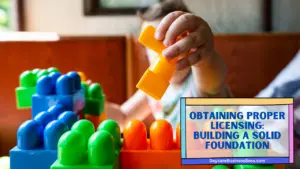Establishing and managing a childcare facility is a gratifying effort that involves careful preparation and attention to numerous details. Establishing a daycare facility may provide a nurturing and instructive atmosphere for young brains, whether you’re a dedicated educator, an entrepreneur, or someone who enjoys working with children.
To effectively start with a daycare nursery, you should begin by obtaining proper licensing, ensuring secure facilities, hiring qualified staff, implementing an engaging curriculum, maintaining open communication with parents, and establishing streamlined operational processes.
Obtaining Proper Licensing: Building a Solid Foundation

Beginning the process of creating a childcare center entails a slew of stages, the most important of which is obtaining the necessary licenses and permits. This initial stage is critical in ensuring that your daycare works legally while also providing a safe and enriching environment for the young brains in your care.
It’s critical to understand that licensing requirements do not apply uniformly; they vary greatly depending on your specific location and jurisdiction. As you embark on this journey, your compass will be a diligent investigation. Investigate the local regulations that apply to daycare facilities, as these will determine the limitations within which your nursery will function.
These regulations cover a wide range of topics, all to ensure the safety and well-being of the children entrusted to your care. These criteria are built around safety regulations, which range from childproofing to fire safety protocols. Staff-to-child ratios are frequently rigorously planned to guarantee that each child receives appropriate attention and supervision. Health and hygiene regulations are meticulously recorded as well, encompassing everything from sanitation methods to immunization records.
Compliance with these standards is more than just a legal obligation; it is a pledge of confidence made with both the children’s family and the community. By following these rules, you demonstrate your commitment to creating a nurturing atmosphere that promotes the safety and development of children.
Read more about: Kiddie Connections: Daycare Marketing Programs for Building Bonds
Ensuring Secure Facilities: Creating a Safe Haven
When it comes to caring for young children, providing a safe and secure atmosphere is not simply a suggestion; it is a requirement. Making the physical space conducive to the well-being of the children entrusted to your care becomes a top consideration as you embark on the adventure of opening a daycare nursery.
A thorough inspection of the physical area is essential before opening the doors to your daycare. This assessment is an important step in identifying potential dangers and taking proactive efforts to reduce them. Childproofing, a cornerstone of safety, consists of a set of well-planned activities that can make a significant impact in preventing accidents.
Implementing childproofing measures begins with minor elements that may represent major concerns. Covering electrical outlets, anchoring furniture to walls, and putting safety gates in key spots are all important measures in creating a safe atmosphere. Proper fire exits are not only a legal need, but also a lifeline in an emergency. Proper ventilation promotes a healthy environment, and carefully established emergency procedures are essential for guiding quick and effective action when unexpected situations arise.
However, safety does not rely just on having safeguards in place; readiness is also essential. Regular safety drills, in which both staff and children participate, lay the framework for a swift and effective reaction to a crisis. These drills help to familiarize participants with evacuation routes, the proper use of safety equipment, and the cooperation needed for a flawless response.
Hiring Qualified Staff: Building a Competent Team
Your team emerges as the threads that weave the intricate tapestry of running a daycare center. Their importance cannot be emphasized, as they become the nurturing figures who shape the experiences of the children in your care. Choosing the appropriate people to join your team is a critical decision, and it’s critical to choose candidates who bring passion, qualifications, and experience to the table.
When choosing employees for your childcare nursery, look for people who are not only professionally qualified but also excited about working with children. Their enthusiasm serves as a driving force, pouring positivity and genuine concern into their encounters. Their educational and experiential background provides a basis for them to form meaningful interactions with youngsters.
A thorough review of their backgrounds is essential as you move forward in constructing your team. Conduct thorough background checks to confirm that the people you’re entrusting with the care of children have a clean record and are free of any potential threats. This practice reinforces your commitment to fostering a safe atmosphere.
However, hiring competent workers is only one side of the issue; investing in their development through training is as critical. Training on best practices for childcare, first aid, and effective communication gives your team the tools they need to navigate many circumstances that may arise. This investment not only improves their skills but also demonstrates your commitment to their professional development.
A dedicated and trained staff develops an environment in which children can grow. Their presence fosters a supportive environment that encourages growth and development. Through their encounters, they become not just educators but also role models, making an indelible mark on the lives of youngsters.
Implementing an Engaging Curriculum: Nurturing Young Minds

The curriculum that influences the everyday experiences of the children in your care is vital to the character of a childcare center. This curriculum is more than just a list of exercises; it is a road map for nourishing their intellectual, emotional, and physical development. The key to creating a vibrant learning environment that ignites curiosity and lays the groundwork for lifelong learning is to create an engaging and age-appropriate curriculum.
Developing a curriculum that meets the developmental requirements of young children requires a combination of intention and inventiveness. Activities that promote cognitive development, emotional awareness, and physical development should be carefully chosen. These activities serve as building blocks for well-rounded development.
Play-based learning is a key component of this strategy. Children explore, experiment, and discover the world around them via play. It facilitates the development of problem-solving abilities, social connections, and language development. Incorporating creative arts into the curriculum stimulates imagination and self-expression, allowing each child to demonstrate their unique talents.
Storytime becomes a treasured tradition in which the power of books is revealed. Aside from the enjoyment of storytelling, it fosters a love of reading, expands vocabulary, and encourages attentive listening. The great outdoors becomes an extension of the classroom, providing students with the opportunity to participate in physical activities that improve health, coordination, and a connection to nature.
Perhaps most crucially, the curriculum encourages social engagement. Group activities, cooperative games, and collaborative projects help children develop important social skills including communication, empathy, and teamwork. These encounters establish the groundwork for future healthy relationships and good communication.
Read more about: Laying the Foundation: Your Journey to Opening a Daycare
Maintaining Open Communication with Parents: Building Trust and Partnership
Effective communication with parents emerges as a cornerstone in the complicated fabric of a daycare nursery’s growth. This communication is more than just an exchange of information; it’s a link between caregivers, parents, and the children at the center of it all. Establishing clear and honest lines of communication is the foundation for trust and a strong partnership.
Keeping parents informed is critical to building trust. Parents gain insight into their child’s daily life with regular updates on their child’s progress, activities, and achievements. It also provides a look into the nurturing environment you’ve painstakingly created. This openness reassures parents that their child is in skilled hands, creating trust in your daycare’s care.
Communication, on the other hand, extends beyond simply updates. By establishing routes for concerns, feedback, and emergencies, you give parents the confidence that their input is valued. This not only indicates your dedication to their participation, but it also allows you to address any problems as they arise, promoting a proactive attitude to problem-solving.
Hosting parent-teacher conferences or educational workshops expands on this cooperation. These events provide opportunities for greater interaction, allowing parents to have meaningful conversations regarding their child’s development, learning journey, and any areas of concern. These conversations go beyond official updates to foster a sense of community in which parents feel heard, understood, and actively involved in their child’s development.
Establishing Streamlined Operational Processes: Ensuring Efficiency
Managing a childcare center requires a careful balance of developing young brains and ensuring the smooth operation of all aspects. The implementation of smooth operations is a key component that underpins this harmony. From attendance tracking to food planning and administrative responsibilities, well-defined processes not only relieve the logistical burden but also provide caregivers with the valuable gift of time, which can be given to the children’s growth and development.
To begin with, having a simplified system in place allows caregivers to quickly record arrivals and departures. This not only ensures correct recordkeeping but also the safety of the children in your care. Meal planning is also essential, as it requires juggling dietary restrictions, sensitivities, and preferences. Streamlining this process reduces errors, ensures children receive adequate nutrition, and reduces worker workload.
Daily routines, which are frequently a rhythmic ballet of activities, sleep, and learning, can be expertly arranged using efficient techniques. This gives the children’s days structure and predictability, which increases their sense of security. Administrative tasks, while less apparent, are just as important. Caregivers may focus on their core purpose – loving and teaching – when paperwork, billing, and documentation are organized.
Using childcare management software is the keystone in the machinery of smooth operations. This technology streamlines record-keeping, automates contact with parents, and makes it easier to manage daily routines. The time saved from administrative activities can then be invested in creating an atmosphere that prioritizes children’s well-being, learning, and exploration.
Creating a Welcoming Environment: The Extra Mile

Little nuances add the brushstrokes of magic to the delicate tapestry of setting up a daycare nursery, transforming it from a basic space to a haven of growth, learning, and joy. Beyond the core steps, there is a world of options – the domain of minute details that enrich the experience for both children and parents.
Begin with the actual surroundings. Decorate the nursery with bright hues to create an environment that exudes energy and enthusiasm. Comfortable and child-friendly furnishings not only improve the aesthetics but also provide a comfortable refuge in which children may relax. Carefully chosen age-appropriate learning tools become the building blocks of curiosity, encouraging engagement and inquiry.
Personalization is essential. Decorate the walls with children’s artwork, creating a showcase of their ingenuity that instills a sense of ownership and pride in the place. This personal touch strengthens the bond between the children and their surroundings, making them feel appreciated and celebrated.
Intentional engagement fosters parental participation. Special events, workshops, and themed days provide parents with opportunities to enter their child’s environment. These events honor not only ethnic diversity but also innovation, fostering a sense of community among families. Parents become active participants and contributors to their child’s learning experiences, becoming partners in their child’s growth journey.
Including these thoughtful details enhances the daycare nursery experience by creating an environment where every corner tells a tale of care, attention, and dedication. As they discover their artwork gracing the walls, the children’s eyes light up with wonder. As they see their child’s development unfold in a supportive environment, parents, in turn, feel a sense of belonging.
Read more about: Laying the Foundation: Your Journey to Opening a Daycare
Frequently Asked Questions

What licenses and permits are needed to open a daycare nursery?
The licenses and permits required are determined by your region and local regulations. A childcare license, health and safety license, and business license are typically required. To gain a full grasp of the rules, contact your local regulatory authority.
How can I secure the safety of the children in my daycare nursery?
Safety is of the utmost importance. Maintain suitable staff-to-child ratios, childproof your facilities, and have defined emergency plans. Inspect the premises regularly for any hazards and adhere to local authorities’ safety regulations.
What qualities should I seek when hiring childcare nursery staff?
Seek candidates with relevant early childhood development education, childcare experience, and a genuine passion for working with children. Conduct background checks, provide extensive training, and give preference to people who show empathy, patience, and strong communication skills.
To learn more on how to start your own daycare checkout my startup documents here.
The information provided by DaycareBusinessBoss.com (“The Site”) is for general informational purposes only. All information on the Site is provided in good faith, however, we make no representation or warranty of any kind, express or implied, regarding the accuracy, adequacy, validity, reliability, availability or completeness of any information on the Site. Under no circumstance shall we have any liability to you for any loss or damage of any kind incurred as a result of the use of the Site or Reliance on any information provided on the Site. Your use of the Site and your reliance on any information on the Site is solely at your own risk.
This blog post is for educational purposes only and does not constitute legal advice. Please consult a legal expert to address your specific needs. Terms and Conditions. (https://daycarebusinessboss.com/terms-conditions/)

Meet Shawn Chun: Entrepreneur and Childcare Business Fan.
I’m a happy individual who happens to be an entrepreneur. I have owned several types of businesses in my life from a coffee shop to an import and export business to an online review business plus a few more and now I create online daycare business resources for those interested in starting new ventures. It’s demanding work but I love it. I do it for those passionate about their business and their goals. That’s why when I meet a childcare business owner, I see myself. I know how hard the struggle is to retain clients, find good employees and keep the business growing all while trying to stay competitive.
That’s why I created Daycare Business Boss: I want to help childcare business owners like you build a thriving business that brings you endless joy and supports your ideal lifestyle.


